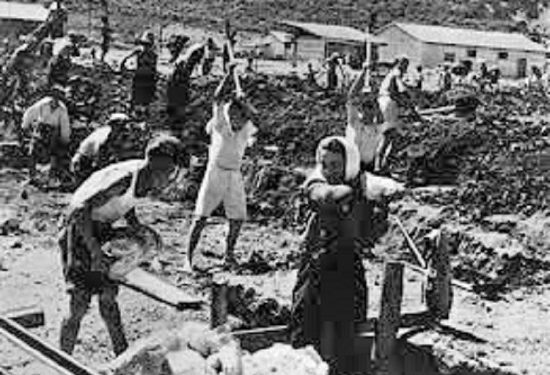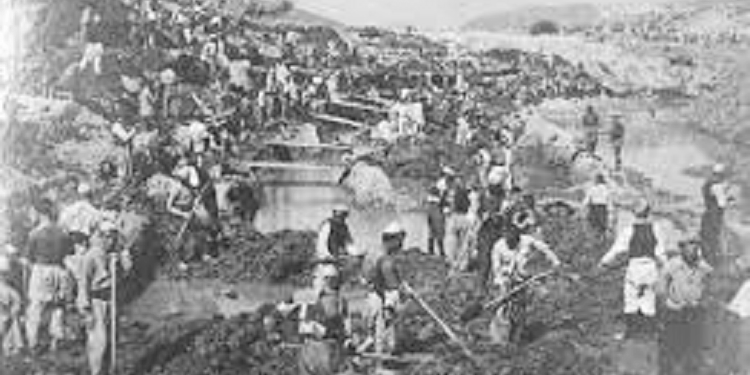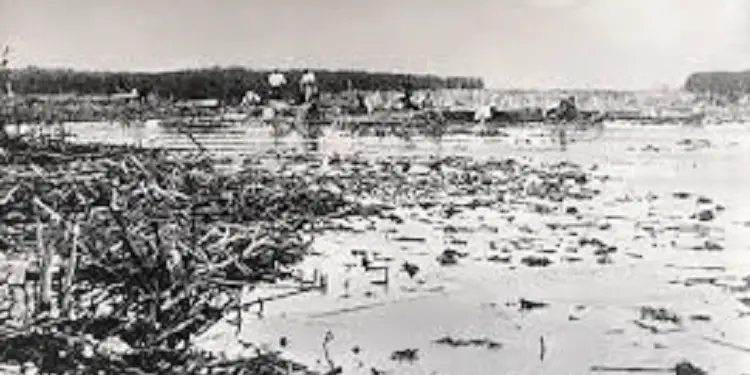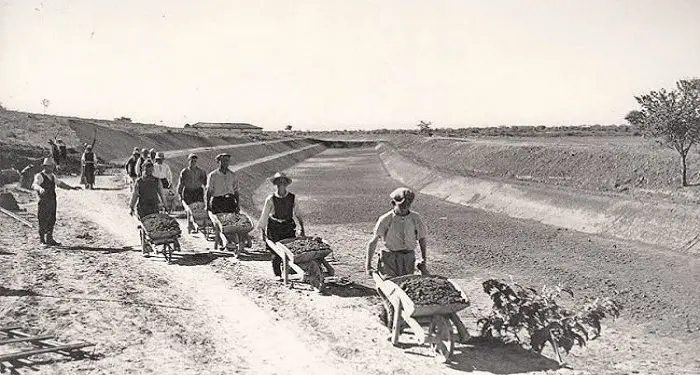By Ventigjar Hamzaraj
Second part
Memorie.al / Ventigjar Hamzaraj, was born in Vlora in 1923, in a family known for patriotic traditions. His father Myqeremi entered the history of Albania as a patriot, fighter and participant in the Vlora War in 1920. Ventigjar completed high school in Metz, France, and continued his high school for Civil Engineering in Italy, but could not finish due to the turmoil of the War. As the scion of a nationalist family, he was arrested shortly after the end of the war, because he was against the newly established communist regime, and in 1946 he was sentenced to 30 years in prison, of which he served 10 years. He spent his whole life in suffering and misery doing heavy manual work to support his family. Ventigjar Hamzaraj, who passed away in 1999, is considered one of the living legends of the anti-communist resistance in the prisons of Enver Hoxha’s dictatorship, and he left many manuscripts of historical value, mainly with events from the camps and political prisons of that regime.
Continues from the previous issue
Being tied up and bundled up for lack of room in that cold, stinking, damp dungeon, with rats that wouldn’t leave me alone, it was almost impossible to close my eyes.
The next day, operative Nauni did not interrogate me, maybe because of psychological pressure or he had other things to do, but the cold had entered my core and I continued to burn newspapers from time to time, secretly of course, so that the policeman would not dictate the light made by the flame.
The next day, Nauni started from work with me. Again the tightening of the bars, again loss of feelings and to come to his senses were the kicks. Passing out was something special that I had never experienced before. It gave you a kind of rest, a kind of physical and spiritual peace. I thought when I came to that death, finally, sweet dog. Maybe this was the reason why I didn’t respond to Naun Tiko anymore, despite all the beatings, insults, threats of shooting.
He brought me back to the company of mice and spiders. The cold continued and newspapers for burning were running out. They were the last newspapers that Izet Kallarati had given. Meanwhile, Shyqyri Allushi (brother of Hysni Lepenica), sent me a new pair of thick shajak trousers.
They warmed me, as if they gave me life. Shyqua saved me from the cold. As it did not occur to him to have sent them before, I would have felt the cold less.
After three days had passed since the second investigation, he questioned me again. It was almost the same questions and answers. He noticed the woolen pants.
– You didn’t have these pants, who gave them to you?
– These are my pants and I had these.
– It’s not true, you didn’t have the pants like that, and they gave them to you.
– These are mine and I had these, you can also say about the coat that it is not the one I had.
– Not about the coat, no, he took mascara, I say about the pants, and he started to hit my legs with the tops of his boots.
The fat shajak softened the blows. Again tightening of the bars and again loss of consciousness. Finally, after six days had passed, I was taken out of the dungeon under the stairs, and I finally returned to my roommates, having broken the record for being in that dungeon.
I felt very helpless the first few days after I got out of the dungeon. Insomnia, the cold, the pain in my hands from the irons, the frequent loss of consciousness, and the blows had weakened me physically.
When I recovered myself, I asked Dr. Jani Melon (who was also a prisoner), what was the cause of the loss of consciousness. He explained to me that the tightening of the irons gave pain that affected the nervous system, which weakened the blood circulation, which, not fully supplying the brain caused cerebral anemia, which, if prolonged, also caused death.
That’s how Naun Tikua worked for me, this dirty criminal who, when he entered the prison cells, resembled a wild beast that pounces on its prey to tear it apart. One day this filth came to our room and we stood up as ordered, with the exception of Shefqet Gjoleka from Kuçi, who was sick.
When Nauni entered, he was lying down and with his head covered, he did not feel or see him. Without one, without two, this beast kicked him. Uncle Shefqeti, who was probably asleep, was shocked; he grabbed her by the throat, lifted her up and slammed her against the wall. The old man shouted “Amani, tell him that I am sick”. Nauni squeezed his throat so hard that Uncle Shefqeti died. Did this kill him, or the disease? A God knows.
Ordinary prisoners were taken out to the yard separately from us, at different times. To fill the tap with water they had to pass in front of the windows of our hut, but it was a strict order not to talk to us. They told them that we were enemies, while they were different. One day Murat Traga saw from the window one of his men who had been imprisoned and asked him why he had been arrested.
At that time, the police saw him talking and cursing and reported it to Nauni. They called Murat to the bars and after an hour he came back dragging his feet. He had a big and strong body but Nauni had beaten him with a thick iron rod. But what a beating! His whole body ached. His back was striped, like a zebra’s, and it took a long time for those wounds to heal.
Nauni practiced this violence to terrorize the prisoners and recruit the weakest, most cowardly as informers. We had a Bosnian in the room, his name was Abdul Hoxha. He was a simple and kind man, but since he had no family in Albania, there was no one to help him. Initially, he was pushed with some money he had when he was arrested, but after a year, it ran out.
One day, Abdul was called to the headquarters where Nauni was. When he later returned to the room, Abdul was pale and shivering as if he had caught a fever. He covered himself with the clothes he had and did not speak. We asked him what he had suffered, but he said that there was nothing. He was very upset and did not speak at all. We suspected, we thought that Avdulin had broken him, had forced him to become an informant.
After a couple of days, he was made a prison cook. From that day on, he went into the cow only to sleep and never talked to anyone. He may have accepted evil, but his nature did not allow him to become a spy, for this reason he cut off all contact with people and did not report anyone.
What I said are assumptions derived from Abdul’s immediate change after Nauni called him, we had no facts about him, and Islam became a mask. Except one thing is true, that in general, spies did not leave them in prison for long. Apparently they needed them to serve better outside. Naturally, these individuals were extremely rare in Vlora prison.
One of them was Sh. M. who also had the nickname “Willow”. This man also had conversations with some of our friends in whom we had faith, such as Meçani and Qendrua, who worked with “Shelgun”. Since he was old, they called him Uncle Sh.
He said to our friends: “I am the informant of the Directorate, but I was made to protect those who are worth it, I give those who do not lift weights and do not target them, do nothing to them. Many of them can beat anyone, such as Spiro Nini, Ramadan Sheri or Qerim Gunbardhi, etc. I spend these to save others from danger”.
This old palatial man said these things without a hint of shame. It happened that there was a rivalry between the spies as to who would be the most trusted of the Directorate. Here is what Sh. had told them one day. M., Meçanit and Kendras:
When we went to Bede, after two weeks, the camp commander, Haxhi Pela, called me and said:
– “You had contact with the Directorate in Vlora”.
– “As you order”, he answered.
– “Why didn’t you connect with us here?”
– “I was waiting for you to call me.”
“Okay, we want you to tell us who is the most dangerous person in Vlora prison.”
The prisoner had answered yes.
“But here, why is there no danger”?
-“Oh, she is easy at all; the most dangerous is Mr. Rr. (This Z.Rr. was a dirty spy from the villages of Himara).
“We don’t know him”, said Haxhi Pela.
“When we go out to work tomorrow, I’ll go out with him.”
And so he did. Mr. Rr. they stopped him but when they went to work in the morning, when we came back we found him bleeding and tied to the poles, they had beaten him to death, but he didn’t die.
We were pleased to see Mr. Rr. like that, but we didn’t understand how it happened that they tortured one of their own. When uncle “Shelgu” told the story, we found out who had done that to him. However, “Popular Power” rewarded both of them. Uncle “Shelgu” started working as a cook, while Mr. Rr. he was released after a few months, although he had been convicted as an agent of Greece.
What people we met in prisons and camps! All kinds of natures. There were those whose eyes were not afraid of death: there were those whose character was iron, that nothing could bend them.
There were honest ignoramuses, there were servile intellectuals, there were loyal people of habit, there were talkative and troublesome people; there were those who overcame hunger as well as those who would do anything for a spoonful of soup.
Prison then was a great school, a great experience, a strong test of the nature and character of man who, under certain conditions, reveals himself in all his inner nakedness deep in his soul.
In the prisoner, nature also develops the sense of smell, which it probably had only in a latent form before. Perhaps for a reckless gesture, an ill-considered word, an out-of-place movement, dictate the dangerous man, the undiscovered informer to track you down. What was it? Self-defense instinct? Foreboding?
In the prisons and camps of that time, you could pretend for a while, but the hard life revealed everything by removing the tin bit by bit, finally the copper came out.
In the summer of 1950, some prisoners (not with severe sentences) were recruited to work on the Peqin-Elbasan railway. Among them was Shyqyri Sharra, who was sentenced to 5 years in prison in 1946 and had one year left to serve.
We found out that Shyqyriu had killed himself in a shocking way. One night when everyone was sleeping, Shyqua had taken the razors and opened the belly. Two razors were broken; with the third he had cut his intestines, and even threw a piece down.
Shyqo’s suicide, almost on the verge of release, remained an enigma for everyone. Nervous breakdown? Mental depression? We could not find out. These are just a few short fragments from life in communist prisons and camps…! Memorie.al














